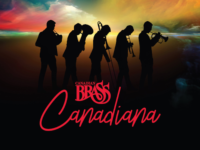Glenn Miller, Duke Ellington, Count Basie and Stan Kenton may have shuffled off this mortal coil, but the big band isn’t dead yet. Despite the harsh economic difficulties of trying to keep 14-18 or more musicians employed, bandleaders from Gordon Goodwin to Brian Setzer to Tommy Igoe still at least occasionally record and tour with a bountiful number of horns and a rhythm section.
The big band sound extends to the present day. A quintet of albums released over the past year and a half attest to the vitality of the sound.
From south Florida comes the Horizons Jazz Orchestra. The Brite Side is a recording of music by Lee Harris, with a couple ringers. Saxophonist Harris led SuperBand with trumpeter Dennis Noday, and after his death it morphed into the Horizon Jazz Orchestra, now led by trombonist Michael Balogh.
Playing compositions and arrangements by Lee Harris, the band kicks into overdrive on the opening “Red Apple Sweet.” The title track pits clavinet against horns before the horns take over, then again turning to keyboards for a lengthy electric piano solo. Throughout, the sound is alternately swinging (“Pure Imagination”) and sweet (muted trumpets and flutes on “The Runner”); most enjoyable is an arrangement of “Summertime,” with muted trumpets in the background, while a slinky soprano sax carries the familiar melody.
He’s too old to be an enfant terrible, but bandleader Ed Palermo has surely gotten under the skin of the jazz police over the years. He’s perhaps best known for his arrangements in tribute to the music of Frank Zappa, but he’s also showcased the music of British Invasion as well as Ellington, Thelonious Monk and John Coltrane.
With The Great Un-American Songbook Vol. III, he’s turned his attention once again to the British bands of the late ’60s and ’70s, with fresh arrangements of material by the Beatles, the Hollies, Jethro Tull, Procol Harum, the Moody Blues, and – as almost always – Zappa. Ever wondered what a big band would sound like with sitar? Me neither, but apparently Palermo did. Turns out it’s pretty cool on “Within You, Without You,” as is a violin leading the big band in Tull’s “Nothing Is Easy.”
With his unorthodox instrumentation and arrangements, it’s tempting to say that Palermo has taken up the mantle of folks like Don Ellis and Gil Evans. But truth to tell, he’s not as willfully experimental as those two, with their multiple bassists and keyboardists, quarter-tone trumpets and oddball time signatures. While Palermo obviously delights in non-standard instrumental combinations, it’s his penchant for reinventing (relatively) familiar rock music in the jazz idiom that stands out. His music is both innovative and approachable. And when he mashes together the likes of King Crimson, ELP and Zappa, it’s truly unique.
It’s probably safe to say that the Pete Ellman Big Band is not well-known outside its home base of Chicago. That’s too bad, as For Pete’s Ache demonstrates. The band is tight and boasts a glorious sound, amply demonstrated on “High Speed Pursuit,” a thumping, noir-ish opener. The title tune is another zesty track, where the saxes state the melodic riff before handing it off to the trumpet section. The album also includes well-known and well-loved tunes like “It Don’t Mean a Thing (If It Ain’t Got That Swing),” and the soloists are in fine fettle throughout. It’s a relatively standard big-band outing, especially when compared with the likes of Palermo, but that doesn’t diminish its appeal.
Then there’s the disc from the 8-Bit Big Band: Released on Jan. 8, Backwards Compatible explores the further reaches of the so-called Great Video Game Songbook. The third such album from Tony-nominated Charlie Rosen, his inspiration is some of the most beloved video game franchises of all time: Sonic the Hedgehog, Final Fantasy, Tetris, Pokemon, and more.
For those familiar with the games, hearing the music performed by a top-notch band will cause a few raised eyebrows. But the great thing is you don’t have to be familiar with the games at all to enjoy the tunes. From the opening “Intro/Chrono Trigger Main Theme” to “Gourmet Race,” and “Dire Dire Docks,” the music rides along like a roller coaster. The roster incorporates the talents of more than 70 of New York City’s finest musicians, with special guests such as Grace Kelly, Adam Neely, Benny Benack III, and the vocal sextet Accent.
Like Palermo, Rosen is unafraid to mix instrumentation, from whooshing synthesizers and punchy horns to fretless bass and voices, both as backing décor and lead lines. There’s something for everyone, from the synth stylings on “Birdman” and sawing strings on “Saria’s Song” to the noir orchestrations of “Snake Eater.” The New York Times says Rosen “exists as a sort of bridge between genres and generations, embracing Broadway standards, pop songs and the music of Tetris.” Who knew?
If standard, occasionally swinging big band is indeed your forte, check out The Third Quarter by the Len Pierro Jazz Orchestra. Woodwind artist Pierro doesn’t even perform on his own recording. Instead, he has written and/or arranged all the material and produced the disc, while enlisting a large ensemble of eight saxes, six trumpets and five trombones, plus rhythm.
Each of the 11 tunes feature at least one soloist; many feature two or more. Heck, the title track includes four. The moods vary, but the quality doesn’t, as each song slips into the next. “As We Know It” features woodwinds and muted trumpets, while the following “In Earnest” is a more uptempo, jaunty tune, with punchy trumpets even when they’re again muted. “No More, No Less” bears some resemblance to “Our Love Is Here to Stay.”
If what you’re looking for is straight ahead big band music without a lot of frills, but with some exemplary playing, you’re in the right place.
- Gregory Porter, Samara Joy, John Paul McGee + Others: 2023’s Seasonal Sounds - November 30, 2023
- John McLaughlin’s Shakti – ‘This Moment’ (2023) - July 14, 2023
- Rolling Stones – ‘GRRR Live!’ (2023) - March 30, 2023




